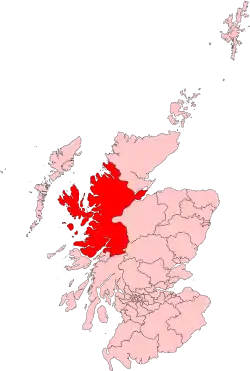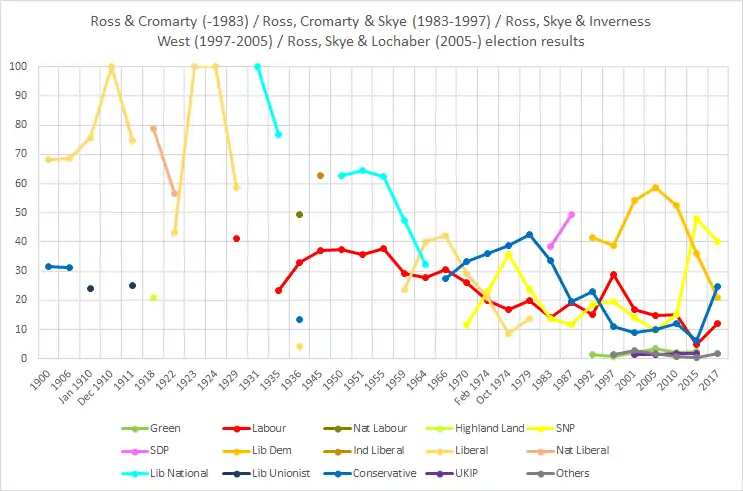| Ross, Skye and Lochaber | |
|---|---|
| County constituency for the House of Commons | |
 Boundary of Ross, Skye and Lochaber in Scotland | |
| Subdivisions of Scotland | Highland |
| Major settlements | Dingwall, Fort William, Kyle of Lochalsh, Mallaig, Muir of Ord, Ullapool, Portree |
| Current constituency | |
| Created | 2005 |
| Member of Parliament | Ian Blackford (SNP) |
| Created from | Ross, Skye & Inverness West and Inverness East, Nairn & Lochaber |
Ross, Skye and Lochaber is a constituency of the House of Commons of the Parliament of the United Kingdom (Westminster). It elects one Member of Parliament (MP) by the first past the post system of election.
The constituency covers a central portion of the Highland council area, and at 12,000 square kilometres (4,600 sq mi), it covers the largest area of any House of Commons constituency in Britain.[1] Until the 2015 general election, it was represented by former Liberal Democrat leader Charles Kennedy. Since then, it has been represented by Ian Blackford, the former leader of the Scottish National Party in the House of Commons from 2017 to 2022.
The seat is due to be abolished for the next general election, with its contents being distributed to neighbouring constituencies.[2]
Boundaries
The constituency was created in 2005 by merging an area from Ross, Skye and Inverness West with an area from Inverness East, Nairn and Lochaber. Most of the rest of Ross, Skye and Inverness West was merged with the rest of Inverness East, Nairn and Lochaber to form Inverness, Nairn, Badenoch and Strathspey. A small area of Ross, Skye and Inverness West was merged into Caithness, Sutherland and Easter Ross.
For representation in the Scottish Parliament (Holyrood) the area of the Westminster constituency is divided between Caithness, Sutherland and Ross and Skye, Lochaber and Badenoch.
Local government area
The Ross, Skye and Lochaber constituency is one of three Westminster constituencies covering the Highland council area, the other two being Inverness, Nairn, Badenoch and Strathspey and Caithness, Sutherland and Easter Ross. Ross, Skye and Lochaber covers a central portion of the council area, with Inverness, Nairn, Badenoch and Strathspey to its south and east and Caithness, Sutherland and Easter Ross to its north. Ross, Skye and Lochaber includes the Black Isle on the east coast of Scotland and, in the west, the Hebridean island of Skye.
When created in 2005, the Ross, Skye and Lochaber constituency covered 26 out of the 80 wards of the council area: 11 wards (Avoch and Fortrose, Black Isle North, Conon and Maryburgh, Dingwall North, Dingwall South, Gairloch, Knockbain and Killearnan, Lochbroom, Lochcarron, Muir of Ord and Strathpeffer and Strathconon) out of the 18 wards of the Ross and Cromarty committee area, all of the six wards of the Skye and Lochalsh area committee, all of the eight wards of the Lochaber committee area and one ward (Beauly and Strathglass) out of the 23 wards of the Inverness area committee.
Ward boundaries were redrawn again in 2007, and the management areas were abolished in favour of three new corporate management areas. The new areas consist of groups of the new wards, and boundaries are similar to those of the Westminster constituencies, as created in 2005. Two areas, the Caithness, Sutherland and Easter Ross area and the Ross, Skye and Lochaber area, have the names of Westminster constituencies. The name of the third area, the Inverness, Nairn, and Badenoch and Strathspey area, is very similar to that of the third constituency.
Proposed abolition
Further to the completion of the 2023 Periodic Review of Westminster constituencies, the seat will be abolished for the next general election.[2] Its electorate will be split roughly equally between Caithness, Sutherland and Easter Ross (Black Isle and Dingwall) and the new constituency of Inverness, Skye and West Ross-shire (Isle of Skye, Mallaig and Fort William). A relatively small area around Ballachullish will be transferred to Argyll and Bute, which is to be renamed Argyll, Bute and South Lochaber.
Members of Parliament
| Election | Member[3] | Party | |
|---|---|---|---|
| 2005 | Charles Kennedy | Liberal Democrat | |
| 2015 | Ian Blackford | SNP | |
Elections

Elections in the 2010s
| Party | Candidate | Votes | % | ±% | |
|---|---|---|---|---|---|
| SNP | Ian Blackford | 19,263 | 48.3 | +8.1 | |
| Liberal Democrats | Craig Harrow | 9,820 | 24.6 | +3.7 | |
| Conservative | Gavin Berkenheger | 6,900 | 17.3 | −7.5 | |
| Labour | John Erskine | 2,448 | 6.1 | −6.1 | |
| Brexit Party | Kate Brownlie | 710 | 1.8 | New | |
| Scottish Christian | Donald Boyd | 460 | 1.2 | New | |
| Scottish Family | Richard Lucas | 268 | 0.7 | New | |
| Majority | 9,443 | 23.7 | +8.3 | ||
| Turnout | 39,869 | 73.5 | +1.7 | ||
| Registered electors | 54,229 | ||||
| SNP hold | Swing | ||||
| Party | Candidate | Votes | % | ±% | |
|---|---|---|---|---|---|
| SNP | Ian Blackford | 15,480 | 40.2 | −7.9 | |
| Conservative | Robert Mackenzie | 9,561 | 24.8 | +18.6 | |
| Liberal Democrats | Jean Davis | 8,042 | 20.9 | −15.0 | |
| Labour | Peter Ó Donnghaile | 4,695 | 12.2 | +7.3 | |
| Independent | Ronnie Campbell | 499 | 1.3 | +0.8 | |
| Something New | Stick Sturrock | 177 | 0.5 | New | |
| Majority | 5,919 | 15.4 | +3.2 | ||
| Turnout | 38,503 | 71.8 | −5.4 | ||
| SNP hold | Swing | −13.3 | |||
| Party | Candidate | Votes | % | ±% | |
|---|---|---|---|---|---|
| SNP | Ian Blackford | 20,119 | 48.1 | +33.0 | |
| Liberal Democrats | Charles Kennedy | 14,995 | 35.9 | −16.7 | |
| Conservative | Lindsay McCallum | 2,598 | 6.2 | −6.0 | |
| Labour | Chris Conniff | 2,043 | 4.9 | −10.2 | |
| Scottish Green | Anne Thomas | 1,051 | 2.5 | +0.3 | |
| UKIP | Philip Anderson | 814 | 1.9 | 0.0 | |
| Independent | Ronnie Campbell | 191 | 0.5 | −0.3 | |
| Majority | 5,124 | 12.2 | N/A | ||
| Turnout | 41,811 | 77.2 | +10.0 | ||
| SNP gain from Liberal Democrats | Swing | +24.9 | |||
| Party | Candidate | Votes | % | ±% | |
|---|---|---|---|---|---|
| Liberal Democrats | Charles Kennedy | 18,335 | 52.6 | -6.1 | |
| Labour | John McKendrick | 5,265 | 15.1 | +0.2 | |
| SNP | Alasdair Stephen | 5,263 | 15.1 | +5.5 | |
| Conservative | Donald Cameron | 4,260 | 12.2 | +2.1 | |
| Scottish Green | Eleanor Scott | 777 | 2.2 | −1.2 | |
| UKIP | Philip Anderson | 659 | 1.9 | +0.4 | |
| Independent | Ronnie Campbell | 279 | 0.8 | New | |
| Majority | 13,070 | 37.5 | −6.3 | ||
| Turnout | 34,838 | 67.2 | +2.8 | ||
| Liberal Democrats hold | Swing | −3.1 | |||
- Note: The constituency was new in 2005 and +/- percentages are notional.
| Party | Candidate | Votes | % | ±% | |
|---|---|---|---|---|---|
| Liberal Democrats | Charles Kennedy | 19,100 | 58.7 | +14.4 | |
| Labour | Christine Conniff | 4,851 | 14.9 | −8.1 | |
| Conservative | John Hodgson | 3,275 | 10.1 | −0.2 | |
| SNP | Mhairi Will | 3,119 | 9.6 | −8.0 | |
| Scottish Green | David Jardine | 1,097 | 3.4 | New | |
| UKIP | Philip Anderson | 500 | 1.5 | +0.6 | |
| Scottish Socialist | Anne Macleod | 412 | 1.3 | −0.7 | |
| Independent | Morris Grant | 184 | 0.6 | New | |
| Majority | 14,249 | 43.8 | |||
| Turnout | 32,538 | 64.4 | +2.6 | ||
| Liberal Democrats hold | Swing | +11.2 | |||
References
- ↑ "Parliamentary Constituencies". Parliament.uk. UK Parliament. Retrieved 8 November 2019.
- 1 2 Boundary Commission for Scotland (28 June 2023). "2023 Review of UK Parliament Constituency Boundaries in Scotland" (PDF). Retrieved 22 July 2023.
- ↑ Leigh Rayment's Historical List of MPs – Constituencies beginning with "R" (part 2)
- ↑ "Notice of poll - UK Parliamentary elections 2019 Ross, Skye and Lochaber Constituency" (PDF). The Highland Council. Retrieved 14 November 2019.
- ↑ "Ross, Skye & Lochaber parliamentary constituency - Election 2019". Retrieved 14 December 2019.
- ↑ "General Election: SNP reselects 54 MPs". www.scotsman.com.
- ↑ Butlin, Heather. "UK Parliamentary General Election". www.highland.gov.uk.
- ↑ "Election Data 2015". Electoral Calculus. Archived from the original on 17 October 2015. Retrieved 17 October 2015.
- ↑ MacNeill, Alison. "Ross, Skye and Lochaber constituency - UK Parliamentary General Election result". www.highland.gov.uk.
- ↑ "Election Data 2010". Electoral Calculus. Archived from the original on 26 July 2013. Retrieved 17 October 2015.
- ↑ "Election Data 2005". Electoral Calculus. Archived from the original on 15 October 2011. Retrieved 18 October 2015.
External links
- "Election 2010: Ross, Skye & Lochaber". BBC News. Retrieved 3 July 2010.*